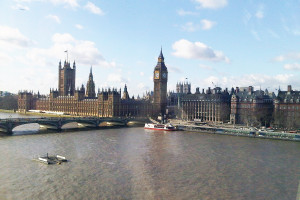Ex-U.K. Ambassador a Lonely Friend of Russia

(Moscow Times – themoscowtimes.com – Howard Amos – October 6, 2015)
As the United Kingdom’s ambassador to Russia from 2004 to 2008, Anthony Brenton was one of the first Western diplomats to be systematically hounded by pro-Kremlin youth groups.
But he said Russian officials told him not to take it personally – and he hasn’t.
With relations between Russia and the West at a post-Cold War low because of the Ukraine crisis, Brenton has taken up an increasingly lonely position among Western experts, slamming the effectiveness of sanctions and urging negotiations with Moscow.
Since retiring from the U.K. Foreign Office, Brenton, 65, has been appointed to a position at Oxford University and has become a prominent commentator on Russian affairs. He is writing two books on Russian history.
In a recent interview with The Moscow Times, Brenton said that a pragmatic approach should be taken with the Kremlin over Syria, where Russia has recently launched a series of air strikes.
Better Assad Than IS
Russian officials have a real fear of the spread of militant Islam, according to Brenton, who said this could be a point of cooperation with the United States in Syria.
Most Western countries have called on Moscow to halt its bombing campaign.
“For Russia, Islamic terrorism is a real domestic threat in a way that the West does not appreciate,” said Brenton. “The Putin I met will take a certain wry pleasure in seizing the initiative on this one, but his reasoning is that the West has made a mess of it.”
While President Vladimir Putin maintains Russia is targeting Islamic State positions in Syria, there is a growing body of evidence to suggest that Russian aircraft are also attacking moderate Syrian insurgent groups to bolster the position of the Syrian army.
Syrian President Bashar Assad is a close Russian ally in the region and said over the weekend that Russia, Syria, Iran and Iraq had formed a coalition to fight rebels in the country.
Brenton maintained that there is actually little love lost for Assad in Moscow.
“I don’t think they particularly like Assad, talking privately to Russians they know exactly what he is and he’s a major embarrassment for them,” said Brenton.
“The Russians have concluded that Assad may be bad, but that IS is worse.”
Syrian Deal?
Assad’s military is accused of using indiscriminate violence during Syria’s bloody four-year civil war that has resulted in tens of thousands of deaths and fueled the rise of Islamic State.
Brenton, who worked at the Foreign Office for 30 years, admitted there are “hideous barriers” to a deal between Putin and the West involving a Russian-brokered power transition in Syria, but he said it might be possible.
“One can imagine a process under which Assad, with his arm twisted up behind his back by the Russians, says that he will begin to talk to the opposition about some sort of broader political process in Syria leading to elections,” Brenton said. “It’s going to require an awful lot of suspension of disbelief on everyone’s part but stranger processes have worked diplomatically in the past.”
While Brenton’s position on Syria may raise eyebrows among the circles of diplomats, experts and officials in which he moves, his views on the Ukraine crisis have been even more controversial.
Failed Sanctions
Brenton said U.K. Prime Minister David Cameron’s comparison of Putin with Hitler in September last year at the height of the Ukraine crisis was foolish, and added that there was a great deal of ignorance – and lack of interest – about Russia among the British political elite.
His biggest bugbear, however, are the sanctions that Western countries imposed on Russia in three waves last year, beginning when Moscow annexed Crimea from Ukraine in March 2014.
Putin has used Western sanctions to strengthen his domestic position and negate the political fallout from low oil prices by blaming the failing economy entirely on the West, according to Brenton.
“They have had exactly the opposite effect from that they were intended to have,” said Brenton.
“The West has imposed economic sanctions on Russia or the Soviet Union eight times since the end of World War II and they have never worked.”
Brenton joined the Foreign and Commonwealth Office (FCO) in 1975, and his first posting to Moscow was in 1994 as an economic, aid and scientific counselor. After leaving Moscow in 1998, he worked as the director of global affairs at the FCO before leaving for Washington in 2001 for a three-year posting as deputy head of the mission. He returned to Russia as ambassador in 2004.
Brenton’s stint as ambassador in Moscow coincided with the London murder of former Russian intelligence officer Alexander Litvinenko and a sharp deterioration in relations between the U.K. and Russia that included the expulsion of diplomats. He said that while sanctions against Russia were inevitable last year, the West should have restricted itself to more targeted measures.
Who Wants Estonia?
Brenton dismissed talk of a new Cold War, which he labeled a “wild and indefensible narrative,” and said Russia was more interested in peace in Ukraine than many Western diplomats believed.
While Brenton said he supported a decision by the North Atlantic Treaty Organization, or NATO, to deploy new troops in Eastern Europe as a response to a Russian military assertiveness, he rejected as unfounded fears that Moscow has significant territorial aspirations in Eastern Europe.
“One of the really depressing phenomena that the Ukrainian crisis has brought forward has been all these old Cold War warriors coming out of their cupboards,” Brenton said.
“The story has been that the bear is on the prowl again: that they want to grab eastern Ukraine, which of course they don’t; they want to grab [the southern Ukrainian port city of] Mariupol, which of course they never did; they want to grab Estonia, but who wants Estonia?”
